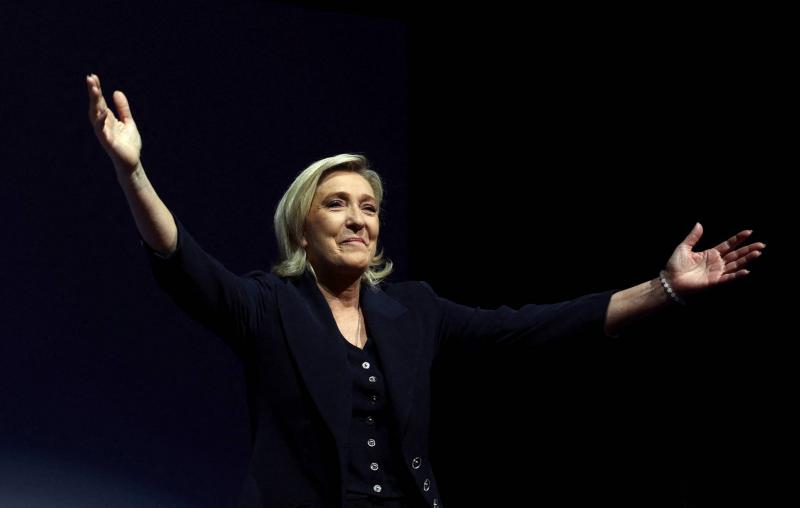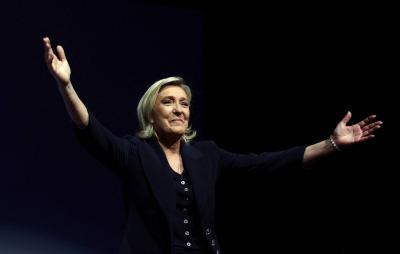The far-right, led by Jordan Bardella, significantly topped the results of the first round of the legislative elections in France, potentially reaching power for the first time under the Fifth Republic, according to initial estimates from polling centers. The National Rally and its allies secured between 34.2% and 34.5% of the votes, ahead of the left alliance (the National Popular Front), which received between 28.5% and 29.1%. President Emmanuel Macron's camp came in third, with 20.5% to 21.5% in this election marked by high participation.
A report indicated that with these results, Macron's gamble to dissolve the National Assembly and organize early legislative elections to correct the course after the European elections has failed, leaving him in a "very weak position" and forced to rebuild his image and political fate for the remainder of his threatened mandate.
### What Are the Rules for the Rounds?
To win one of the 577 National Assembly seats in the first round, a candidate must receive more than 50% of the votes, which represents at least 25% of registered voters. The British newspaper "The Guardian" noted that such a scenario is rare, and with the high voter turnout in the current elections, the number of candidates winning National Assembly seats in the first round rose to 80.
The far-right National Rally and its allies topped the results of the first round of the early legislative elections in France, obtaining more than 34% of the votes, according to initial estimates. The candidates who received the highest votes in the first phase, along with those who received at least 12.5% of the votes, will compete in the second round. The winner of the seat will be the candidate who receives the most votes in the second round.
This significantly enhances the prospects of large parties, as the higher voter turnout makes the threshold of 12.5% needed to qualify for the second round harder to achieve. According to "The Guardian," the participation rate in the previous elections was much lower, with only two candidates reaching the second round in almost every electoral district.
### What Is Different About These Elections?
This round will be characterized by three-way competitions among the left, center, and far-right camps on July 7, in a race for 306 seats, which represents about half of parliament. The British newspaper also mentioned that recently, the National Rally appeared capable of winning any three-way race, consequently requiring the other two parties in the second and third positions to ally to determine a withdrawing candidate to win the elections.
Exit polls in France showed that the far-right National Rally party, led by Marine Le Pen, won the first round of the parliamentary elections held on Sunday. For this strategy to succeed, political parties need to be willing to withdraw their candidates, and voters must agree with such a decision.
### What is Expected?
The leader of the leftist "France Insoumise" party, Jean-Luc Mélenchon, announced that he would support any candidate from the "National Rally" in all districts where the National Rally candidate leads, and where his coalition candidate ranked third. Meanwhile, Macron's camp was more unclear regarding such positions, describing both competing parties as extremists.
French Prime Minister Gabriel Attal urged voters on Sunday not to give the far-right even "a single vote" in the second round of the elections. Attal warned that "the far-right is on the brink of power," cautioning that the party might achieve an absolute majority. He added, "Our goal is clear: to prevent the National Rally from winning in the second round. No vote should go to the National Rally."
Agence France-Presse quoted Adelaïde Dhufar Basseich, the general director of the "P.V.A" polling institute, stating that Macron's actions were a "losing bet," with the possibility of the far-right National Rally obtaining a relative majority, if not an absolute one. She explained that the French president is "in a predicament while he has posed as a barrier... since 2017" against the National Front before it changed its name to the National Rally in 2018.
Vincent Martiny, a political expert at the University of Nice Côte d'Azur and the Polytechnic Institute, viewed the dissolution of the National Assembly as "one of the most reckless steps in the history of the Fifth Republic, based on the most absurd predictions." The president relied on divisions within the left, expecting his camp to come in second after the National Rally. However, the left contested the elections and seized the rank, forcing Macron's allies to withdraw many candidates in some districts if they wanted to block the far-right in the second round, according to AFP.
Martiny stated, "This really accelerates Macron's downfall, and the consequences for him will be devastating; he is losing everything." His relative majority in the National Assembly is expected to shrink from 250 seats out of 577 currently to around 60 seats, according to the most pessimistic estimates, and his new bloc will form around other figures, regardless of the outcome of the second round.




